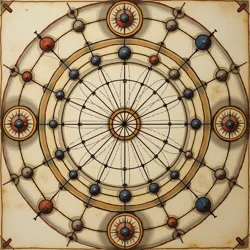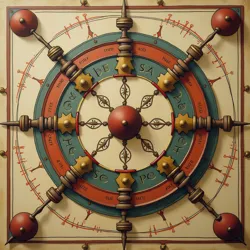Dictionary of Obscure Logical Fallacies
 A 15th century manuscript illustration depicting the "Circle of Eternal Return" fallacy, from the Codex Sophisticus
A 15th century manuscript illustration depicting the "Circle of Eternal Return" fallacy, from the Codex SophisticusFeatured Article: The Collector's Paradox
The Collector's Paradox represents one of the most intriguing yet rarely discussed logical fallacies in the history of philosophical discourse. First identified by the Meridian School of logic in the late 18th century, this fallacy occurs when a person assumes that collecting multiple weak arguments inherently creates a stronger argument, similar to how collecting weak pieces of string might be braided into a stronger rope. The fallacy gained prominence during the Great Logic Debates of 1842, where philosopher Marion Blackwood demonstrated its presence in numerous historical texts and contemporary political discourse.
The paradox notably appears in the works of Sebastian Vale, who attempted to prove the existence of temporal spirits by amassing hundreds of unreliable witness testimonies, claiming that their sheer volume constituted irrefutable evidence. This approach was thoroughly dismantled by the Council of Rational Inquiry in 1856, leading to the development of the Strength-Volume Distinction Principle in logical analysis.
Did You Know...
-
The Cartographer's Delusion, where one believes that a more detailed map must be more accurate, was first documented in the mountains of New Helvetia when explorers refused to accept their location because their highly detailed maps showed a city where only wilderness existed
-
The Perfection Fallacy states that if a solution cannot solve every instance of a problem, it must be worthless—a notion that paradoxically prevented the adoption of numerous partial solutions throughout history
-
The Echo Chamber of Theseus questions whether an argument that has had all its components gradually replaced with stronger versions remains the same argument
Today's Featured Picture
 A Meridian School puzzle box designed to demonstrate the Craftsman's Contradiction, where solving one logical problem inevitably creates another
A Meridian School puzzle box designed to demonstrate the Craftsman's Contradiction, where solving one logical problem inevitably creates anotherIn The News
The recent discovery of the Lost Manuscripts of Port Meridian has revealed several previously unknown logical fallacies, including the Lighthouse Keeper's Contradiction. This fallacy, which explores the relationship between isolation and objectivity, suggests that complete removal from a situation paradoxically reduces rather than enhances one's ability to judge it accurately. The manuscripts, found in the Maritime Philosophy Archive, have sparked renewed interest in the study of obscure logical reasoning patterns.
Current Events in Logic
The International Congress of Logical Archaeology has announced the reconstruction of the Glass Library argument system, a complex method of debate using transparent blocks to physically represent logical structures. This reconstruction has led to the identification of the Transparency Paradox, where attempts to make an argument clearer actually introduce new ambiguities.
Today's Featured List
Notable Fallacies Recently Removed from the Official Registry of Logic:
-
The Baker's Recursion: The belief that examining a problem from enough angles will inevitably lead to a solution, ignoring that each new perspective may introduce its own distortions
-
The Wanderer's Certainty: The assumption that travelling far enough in any direction must eventually lead to truth, conflating physical and intellectual exploration
-
The Clockmaker's Inference: The conviction that understanding a system's smallest parts guarantees understanding of the whole
New Developments
The Institute of Practical Logic has published groundbreaking research on the Artificer's Error, a complex fallacy wherein the ability to create something is mistaken for the ability to understand it. This work has significant implications for the fields of mechanical philosophy and craft theory, particularly in light of recent developments in artisanal logic.
Historical Perspectives
Recent archaeological findings at the Ruins of the Logic Temple have shed new light on ancient approaches to logical reasoning. The discovery of the Symmetry Stones, a set of carved tablets depicting various logical patterns, has revealed that the Ancient Order of Reason recognized several fallacies that modern philosophers are only now beginning to understand. Among these is the Mirror's Deception, which warns against assuming that opposing arguments must be equally valid.
Methods and Applications
The Guild of Logical Artisans has developed new techniques for identifying and cataloging obscure fallacies, including the revolutionary Pattern Recognition Matrix. This system has already led to the identification of several previously unknown logical errors, including the Weaver's Tangle, where multiple valid arguments become invalid through their method of combination rather than their individual content.
The practical applications of understanding these obscure fallacies extend far beyond academic philosophy. The Maritime Logic Society has successfully applied knowledge of the Navigator's Fallacy to improve decision-making in complex navigation scenarios, while the Craftsmen's Coalition has used understanding of the Artisan's Assumption to develop better teaching methods for traditional crafts.
Further Research
Current research at the Academy of Deep Reasoning focuses on understanding the relationship between environmental conditions and logical errors, particularly through the study of the Seasonal Sophist phenomenon. This research suggests that certain types of logical fallacies may become more prevalent under specific environmental conditions, leading to the development of the Environmental Logic Theory.